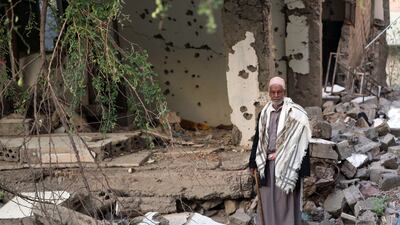Since late 2014, Yemen has suffered as a result of a coup that that overthrew a legitimate government, leading to a war that continues to this day. From gunfire to suicide bombings to landmines, the most terrible effect of the conflict on Yemen's people is the violence. In total, the war has taken an estimated 377,000 lives.
But after eight years of suffering, The National has now heard from the US Special Envoy for Yemen, Tim Lenderking, that he is "cautiously optimistic" that a two-month truce struck in April, which has significantly decreased fighting, will be extended, possibly even into a permanent settlement.
It is another sign that the past few months have been momentous. On top of a decrease in fighting, last week the first commercial flight in nearly six years took off from the country's capital Sanaa, landing in Jordan. There are plans for a similar resumption to Egypt. At the beginning of the month, the Saudi-led coalition fighting Iran-backed Houthi rebels said it would return 163 prisoners to the Iran-backed group, a gesture to keep the ceasefire on track. In April, Yemen got a new presidential council and the Houthis said they would stop using child soldiers.
After years of inaction, these developments are signs that there could be a light at the end of the tunnel. But it would still be a long tunnel. While the end of violence is the most important step to begin reconstruction, it is important to remember that 60 per cent of the 377,000 deaths in the conflict came not from direct fighting, but from the ensuing social and economic breakdown and the failure of the Houthis, who control the capital, which has led to disease – cholera and Covid-19 in particular – hunger, unsafe water and a decline in health care.
Overhanging all of this is mounting international fatigue. So many wasted years coupled with a new crisis in Ukraine risk diverting attention from this important political moment, the best opportunity to help Yemenis in years. Losing focus now would be disastrous, and there already signs it is happening. A UN conference to raise funds to salvage the decaying FSO Safer – an oil tanker moored of Yemen that could explode at any moment with devastating consequences for the country and its neighbours – raised just $33 million out of a target of $144m. And in April, WHO Director General Tedros Adhanom Ghebreyesus cited Yemen, among countries such as Ethiopia and Afghanistan, as a victim of international distraction as the Ukraine conflict intensified. From an organisation that plays an important role in bolstering the country's health sector, this is worrying.
Mr Lenderking thanked Gulf countries for their support, saying positive developments would not have happened without them. Its nations will continue contributing and exerting pressure when needed. Iran's participation will also be required. When asked by The National if Tehran was at risk of disengaging as talks in Austria over a new nuclear deal falter, he said: "We have seen the Yemen truce and de-escalation moving forward while the talks in Vienna have been stalled." While he "doesn't take anything for granted", he remains hopeful for more collaboration.
The next hurdle will be extending the truce, which expires on June 2. Eventually, in consort with the UN, there are hopes of a permanent one. Much has to be addressed until that happens, but much is to be gained if it does. It will be a victory for international diplomacy at a time when none are forthcoming elsewhere. And, most importantly of all, it could begin the process of ending the suffering of Yemen's people that has still not ceased, even during this ceasefire.










